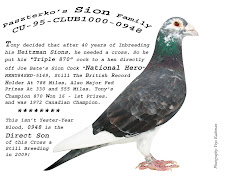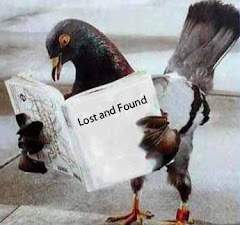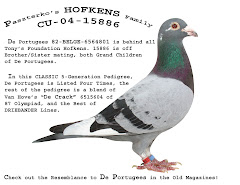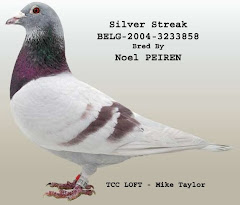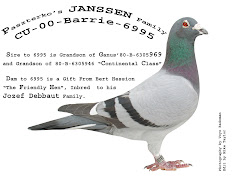TAIPEI TIMES
By Jules Quartly / STAFF REPORTER
Sunday, January 4, 2004
Taiwan leads the world in pigeon racing. Nowhere else in the world comes close in terms of financial reward, devotion and innovative ways of increasing the speed and endurance of its flocks
The life of a racing pigeon in Taiwan is spoiled, competitive and short. The bird is pampered for its first four months and is subsequently forced to exceed the limits of its strength in a series of progressively faster and longer races, to either become the champion and breed to its heart's content in avian luxury, or lose and end up on the barbecue.
It could be argued there is no bigger or more lucrative sport in the country, as there are hundreds of thousands of pigeon fanciers, up to 500 races a week and a bird can earn more in one race than a baseball player can in a season.
No other country comes close to Taiwan in terms of the amount of money involved, the number of birds and races and the fervor with which the sport is followed.
But pigeon racing in Taiwan has a shady reputation, not only because of the extraordinary lengths to which breeders will go to win, but also because of the sport's deep connections to gangsters, especially through gambling.
In other parts of the world where pigeon racing is practiced, the birds are viewed more like pets and national regulations curb illegal gambling and help prevent burnout and loss of bird life. Here, there is less space for sentimentality.
"We hear a lot about how Europeans can't believe the money and racing here. They are very jealous," said a man surnamed Du, during a recent interview. Du is a senior official in one of the 15 pigeon-racing associations registered in Taipei County and, like other people interviewed for this article, requested his full name not be used, for fear of attracting police attention.
"Pigeon racing is serious business. it's much more difficult than keeping a pet. There is the nutrition, management, breeding lines and racing arrangements, so many things," Du said.
"There are so many variables that it's impossible for there to be one winner all the time. So, as a sport, it's very open."
Signing up for the big time
As Du checked off two baskets of pigeons brought into his office so their ages could be verified for an upcoming race, he talked about how he has been raising pigeons for 30 years and racing them professionally for 25.
He gauges the age of the birds by examining the color of their wings, measuring them, looking at their eyes and checking for other age-defining signs. He also closely examines the ring on one of each pigeon's legs, which is supposed to give the birth date of the bird, the name of its owner and other information.
All birds are logged no later than three or four days after birth, but occasionally the tags are broken off or tampered with and replaced with another ring to enter a different bird for a race.
On this day there are no problems, and when Du is certain the bird is who its owner claims it is, he stamps its wing with a large red seal. The pigeons coo as if pleased at all the attention in the expert hands of their handlers. They are all sleek, well-bred and healthy creatures.
One of Du's colleagues in the association, who has been listening to the conversation, puts down his motorbike helmet and says that pigeon racing must be taken seriously. "We test our birds to the limit," he says.
He explains that the birds begin training at a young age with small, private races that lead to three or four time trials in which they must perform well to enter the big races.
Few pigeons make it to compete in the main races -- the ones with money at stake -- and only the top three or four win big prizes.
"After six months, the birds are picked for breeding, or sold, or barbecued," Du says, as his friends joke about how tasty pigeon meat is to eat. "Of course we don't eat our own birds. We have a relationship with them," Du adds.
Blown away
Full-grown pigeons can fly at speeds of up to 150kph and cover over 1,000km in a day. Due to Taiwan's relatively short size of 400km north to south, most races are short-distance flights using young, immature birds that fly about 70kph to make the race more competitive.
For longer races, the birds are taken by ship to points as far as 350km into the East China Sea, north of Taiwan, and are released. Judges calculate the exact distance from the launch point to each pigeon master's loft and the winners are the birds that maintain the fastest meters-per-minute speed.
To fly the distance back home, pigeons rely on their highly tuned senses. A pigeon's eyes can see over 40km, its ears can hear winds whistling through mountains hundreds of kilometers away and it has an acute sense of smell, as well as being able to detect the earth's magnetic fields.
Nevertheless, many birds don't make it back.
"Sometimes the birds get blown away or get lost and fly to China. Sometimes there is a bad forecast, or it is too late and nearly all the birds are lost," says Du, referring to a case two months ago when pigeon fanciers in southern Taiwan considered suing the central meteorological center for the loss of their birds after 90 percent of entrants in a race were wiped out by a typhoon off the coast.
Competitions within associations culminate in Five-Race championships. To make it to the championship and win, a bird will have to fly home about 15 times within three months or less, covering about 4,000km at an average speed of about 73m a minute.
Each association runs three, maybe four, series of races a year and there are two main types of races, one for young birds of four months or so -- more common in the south -- and other races for birds about six months.
Other dangers lurk below
Even if a pigeon avoids bad weather and predators, it may still be brought down by guns or by people seeking to kidnap the birds by catching them in huge nets hung off the mountains.
A senior member of the association, surnamed Zhang, said bird-napping pigeons for ransom was a particularly severe problem during preliminary races. The bird-nappers, Zhang said, usually send an identifying ring with a ransom demand that can range from NT$2,000 to NT$100,000.
"It's easy money to make and it's useless to ask for help from the police. So usually you must settle in private, or else," Zhang said, making a face as if to say a bird would be in trouble if money wasn't paid up.
Occasionally, robbers raid lofts, either to steal the pigeons or put them out of action. In response to the threat, some owners have set up elaborate security systems, while others have 24-hour security guards. Before a championship, the security arrangements can be even more rigorous, sometimes even employing armed guards.
A so-called "Pigeon King" can be worth up to NT$3 million through its breeding rights and prize-winning potential, which makes it worth protecting.
A bird will reach "Pigeon King" status if it wins or is likely to win a championship, the prizes for which can run up to NT$100 million, but which more commonly top out between NT$1 million to NT$4 million. Prizes take the form of cars, or motorbikes, to avoid taxes.
Prize money is raised through the association by pooling the race entrance fees. In a common race, leg rings for 15 birds cost NT$5,000, with 200 participating members that bring the pot to NT$1 million.
There is, however, no standard race format. Larger competitions obviously create larger prizes and races sometimes pit 14,000 birds against each other. Race rings can cost up to NT$45,000.
There are over 150 official pigeon-racing associations in the country as a whole, in addition to the estimated 400 unregistered associations and unknown numbers of private individuals who race pigeons between themselves. As for the total number of pigeon fanciers in the country, estimates range from 100,000 up to half a million.
With gambling, the amount of money washing around a race, in what are termed "under-the-table" payments, are by most estimates three to four times as large as the total prize money.
Drugs everywhere
Not surprisingly, gambling draws gangsters into pigeon racing and they are said to control many aspects of the sport.
What also allows gangsters to operate in the sport is the lack of central government regulation. Authorities, for the most part, turn a blind eye to the gambling, as long as it doesn't generate bad publicity or rampant lawlessness.
Doping in racing pigeons, is also common. Many pigeon lofts have an array of medicines and liniments that put a pharmacy to shame. Even ordinary birds can be made into champions by slowing the molting process, providing stimulants, enhancing muscle growth and increasing their metabolic rate. Steroids, cortisone, hormone growth agents, even gene therapy is utilized to develop the ultimate feathered racing machine.
"Anything and everything is possible," Du said, looking over his glasses and rolling his eyes, as if to emphasize the fact that he has seen it all.
If gambling were either legal in Taiwan, or the prize money were less, pigeon racing would likely lose its popularity. Betting on pigeon racing is legal in Europe, the US and elsewhere, but, because races are so open, the odds are long and punters stand little chance of winning. This reduces the prize money and with it the motivation for gambling.
Though Taiwanese are avid gamblers abroad and through on-line betting sites, stringent regulations against gambling within the country remain in place without any likelihood of changing soon. Last year, for instance, the British Internet betting company Sportingbet was prevented from setting up local operations, and a referendum on legalizing gambling for casino operations in Penghu on Dec. 27 was inconclusive, due to a derisory 21-percent turnout.
Pricey passion
Despite its seamy reputation, most pigeon-racing adherents are average citizens who genuinely love their birds. They were either brought up with them, or have found companionship through racing and joining clubs.
Most pigeon fanciers, even professionals, don't strike it rich with their birds. And like any other sport or business, progress requires investment and overhead can be high.
First, there is the price of pigeons. Though some birds cost as little as NT$1,000, at least 15 pigeons are needed to participate in a registered association's race. Top breeding pigeons fetch upwards of NT$50,000, with the most expensive birds coming from Belgium, Holland and England. The most expensive racing pigeon ever bought was Invincible Spirit bought by Louella Pigeon in 1992 for 110,000 pounds (NT$6.7 million).
"If you keep losing you have to buy pigeons from abroad," Du said.
For that, people can turn to weighty weekly and monthly publications filled with catalogues of local and international birds and which provide full breakdowns on their breeding histories, weights, racing statistics, plus streams of advertising from the pigeon-rearing supplies industry.
On top of this are the association registration fees and race ring fees. Associations will often make interest on the fees and take 5 percent of winnings to cover rent and utilities and pay a full-time official and a secretary. Other overhead includes boat-operation fees, transportation, drugs and veterinary bills.
Living in the city
In cities, pigeon lofts are banned near airports and in densely populated residential areas. The restrictions have forced many owners to pool their pigeons in one loft and pay a manager to save money and improve conditions. The fee paid to the loft manager sometimes includes a percentage of the winnings, therefore providing an incentive to take better care of the birds.
"Some of the young guys are in it for the lottery money, it's true. But they know it's a long shot," pigeon loft owner Wu said.
Despite the low odds, there is no lack of avid pigeon-racing fans willing to take their shot.
Currently, pigeon racing in Taiwan is unique for its financial reward, the devotion of its financiers and the innovative ways of increasing the speed and endurance of its flocks.
There isn't an international championship for pigeon racing, but if there were, Taiwan would almost certainly be the gold-medal winner.
Read more ...







